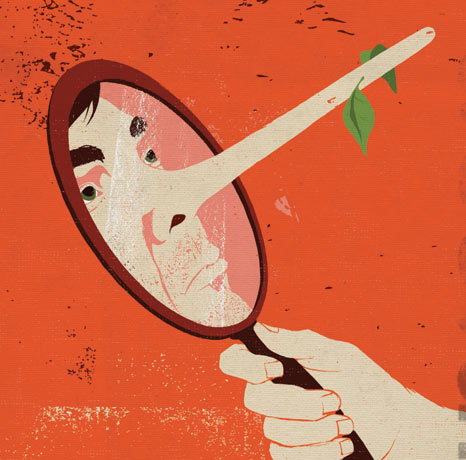
Even though it's the kind of thing you're supposed to stop worrying about by around age eight, I'm still plunged into minor existential terror by the realisation that I've never seen my own face. Same for you. Sure, you've seen likenesses, but photos are notoriously unreliable, and mirrors provide a mirror image. Yes, there are special mirrors, known as "true mirrors", which give a non-reversed reflection, but ultimately all mirrors are inaccurate, thanks to the confusing truth – and I hate to break this to anyone whose New Year goals include weight loss – that your mirror image is always half the size of the real thing (physorg.com/news9242.html). Sometimes, I think I glimpse my real self briefly, in profile, in the angled mirrors of fitting rooms in shops. But I can never believe that someone would have a nose like that, so I erase the image from my mind. Mostly, I go through life with little idea of how I really look, leaving me free to assume that I broadly resemble Ryan Gosling. Nobody asked your opinion, thanks.
Understanding how we come across may be vital for relationships and careers alike, but many studies confirm we're rubbish at it. Part of the problem, as you'd expect, is our desire to think highly of ourselves, or sometimes to be especially harsh on ourselves. But it's also a question of abstraction: we think of ourselves in much more granular detail than we do others. It's for this reason that people do badly, in experiments, when asked to put themselves in someone else's shoes; their judgments about how others see them prove mistaken. A more reliable technique is to imagine yourself a month in the future, and make your judgments about this "future you". This prompts people to think of themselves more abstractly, which is what others were doing anyway.
As the author Gretchen Rubin noted on her blog, a related technique – thinking about yourself in the third person – can be a direct path to self-knowledge. "Yes, I admit, this approach makes me sound a bit affected and self-important," she wrote, "but the thing is, it really works." Feeling depleted, she recalled, "I asked myself, 'What's the best medicine for Gretchen when she feels drained?' And, when I framed the question... from outside myself, I knew the answer." Cheesy? Sure. Best done silently, so you don't end up sounding like comically deluded American presidential hopeful Herman Cain ("Here's one thing people don't know about Herman Cain...")? Absolutely. But some of the best happiness strategies are both.
Sometimes the best plan is literally to ask others. Research suggests they're better than you are at judging intellect-related aspects of your personality. Or consider the experiment in which speed-daters got to choose between seeing a photo and autobiography of a potential partner, or hearing what some other dater had made of the person in question. Most people opted for the former: they wanted to make up their own minds. Yet the third party's assessment proved a better predictor of whether attraction was sparked.
A final third-person tip, culled from Reddit.com: resist impulse purchases by imagining a stranger offering you the cash equivalent of what you're tempted to buy. Which would you choose? Oliver finds this an intriguing idea, and plans to bear it in mind.
oliver.burkeman@theguardian.com; twitter.com/oliverburkeman

